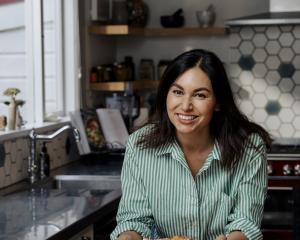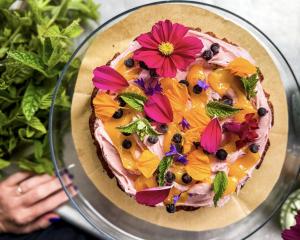Chef Alex Davies is on a mission to showcase sustainable ‘‘plantcentric'' cuisine. He tells Rebecca Fox about spreading the word in Dunedin.
Alex Davies is quick to point out what he cooks is not ‘‘vegetarian food''.
‘‘It's not hippish, I'm not burning incense. I'm creating interesting food.''
The Christchurch-based chef is making a name for himself creating interesting ‘‘gatherings'' or pop-up restaurants featuring food based on vegetables and an interesting experience.
He intends to do the same in Dunedin, where he is doing a couple of his ‘‘gatherings'' as part of the New Zealand International Design Festival and Studio at Morning Magpie cafe.
While always conscious about what he was consuming, he started out producing food using the ‘‘nose to tail'' philosophy but soon realised that was not enough.
‘‘I've had a shift in focus to plants. Now I make them the star of the show.''
His aim is to show people how variable and exciting vegetables can be when ‘‘meat is not the star of the show''.
Cantabrians had taken to his new philosophy really well, he believed.
And it is not just a marketing gimmick for Davies. He gets out there and gets his hands dirty at an organic farm once a week. They plant and grow some more unusual species for him and he gets to see the growing process from seed to edible plant, better understanding the producing cycle.
‘‘It's essential for any chef. It's one of my duties to bring that story to people. It is a conversation we can engage in when sitting down to eat.''
He also keeps in close contact with other small producers in the Cashmere Hills who provide him with produce.
‘‘You can get caught up in everything and forget the work that goes into producing these things.''
To honour that work he did not use anything including spices not produced locally, except for salt, although that was produced in Blenheim, so did not come from far away.
‘‘Oils, nuts, I make seasonings, I dehydrate and ferment creating new flavour expressions that bring that time and place.''
As more people embraced his style of cooking he believed people would look differently at vegetables.
‘‘The demand will only increase.''
While many farmers were caught in a trap of growing the same crop over and over, a lot did branch out to more interesting varieties.
He saw it as a chef's duty to show people vegetables such as the humble carrot did not just have to be boiled but could be combined with other ingredients in inspiring ways.
‘‘I get quite excited about carrots. They're underrated. There are seven or eight different varieties and colours.''
They could be fermented, which gives them a different flavour profile - more sour.
At the moment Davies has been cooking a lot of celeriac and Jerusalem artichokes and as winter arrived, the leeks, onions and root vegetables were coming on.
Mushrooms were ever popular, as was seaweed, which brought the ‘‘shoreline'' flavours into the cooking.
‘‘Put it in a seaweed broth and it tastes like I'm in the ocean.''
Horopito, the New Zealand pepper was another ingredient he liked to promote.
‘‘It's something I use a lot more of and should be regarded a lot higher.''
Davies followed his family to New Zealand 11 years ago, from England, and trained in New Zealand, working in Queenstown and Napier.
He learnt much from Napier chef Jeremy Rameka, from Pacifica, about indigenous plants and how food could be created to be reflective of this place.
‘‘It shifted me towards creating this identity using foods grown in this region.''
There was no reason why New Zealand could not have more of a regional food identity.
‘‘[There are] strong regional differences. You'll have sweeter root vegetables down your way because you get colder weather and more frosts. They're the best in the country.''
It meant when creating his menu for Dunedin diners this week he will be incorporating the famous Southland swede.
‘‘I can't not.
‘‘Dunedin and Otago should embrace and celebrate their food - be proud of it.''
●Alex Davies is holding a workshop at the International Food Design Conference and Studio at Otago Polytechnic on Friday and his holding ‘‘Gatherings'' at Morning Magpie tomorrow and Friday.












